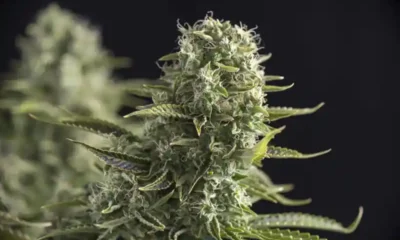Connect with us
Published
7 months agoon

The world has eagerly looked toward Germany as the country’s leaders have teased pending cannabis legalization for over a year now. Finally, it looks as though the country may be moving ahead toward some major cannabis policy changes.
The Bundestag, Germany’s federal parliament, is set to deliberate on a bill proposed by the federal government later this week, Wednesday, Oct. 18, regarding controlled cannabis usage and other provisions that would finally legalize cannabis in the country, according to a government news release.
The proposed draft law was originally on the Bundestag’s Oct. 13 agenda, but the initiative’s discussion was removed.
The proposed legislation is backed by Chancellor Olaf Scholz and would legalize the possession and consumption of cannabis for adults under specific conditions. The bill includes provisions surrounding private cultivation, non-commercial community farming and the controlled distribution of cannabis by cultivators and related associations. These provisions are all encompassed by a goal of promoting responsible cannabis use as Germany potentially moves forward with legalization.
The bill itself is nothing new. It was first introduced in April and conceived as a toned down version of the original project after talks with the EU, which pushed for a more gradual approach to cannabis legalization.
The country’s ministry of health unveiled a draft bill in July, providing further details on the new regulations for personal use and cultivation of cannabis. According to the ministry, the release of the draft bill was one part of a “two-pillar model” to legalize cannabis cultivation by adults for personal consumption, along with communal, non-commercial cannabis cultivation in cultivation associations.
Under the draft bill, adults over the age of 18 would be allowed to possess up to 25 grams of cannabis for personal use and cultivate a maximum of three plants. The legislation also allows an association to accept up to 500 members with a residency in Germany. Each member of the association would be eligible to receive either 25 grams per day or 50 grams per month for personal use.
The law also stipulates that cannabis must be kept away from children and adolescents, banning cannabis consumption in the “immediate vicinity” of individuals under 18, within a 200-meter radius of schools, children’s and youth facilities, playground, publicly accessible sports facilities and pedestrian zones between 7 a.m. and 8 p.m.
Young adults between ages 18 and 21 would also have a lower limit: 30 grams monthly at a THC content capped at 10%.
While the updated legislation seems to be fairly conservative, especially by American standards, the CDU/CSU faction (a center-right Christian democratic political alliance of two of Germany’s political parties) has demanded the termination of the planned legalization and seeks further public awareness about the substance’s risks.
The parties have expressed concern about the effects of cannabis on developing brains, along with the potential effects of cannabis on memory, learning, problem solving and other mental health issues — despite the fact that many of these assertions have already been studied and debunked in recent research.
The Bundesrat has also expressed concerns about implementing some of the proposed regulations, namely youth protection zones and protective measures in private spaces.
Still, the federal government seems optimistic about the potential benefits.
““In the opinion of the federal government, the current drug policy on cannabis use is reaching its limit,” the ministry explained. “Despite the ban on its purchase and possession, cannabis is widely used and use has increased in recent years. The consumption of cannabis, which is obtained from the black market, is often associated with an increased health risk… The content is unknown and may contain toxic admixtures, impurities and synthetic cannabinoids whose potency cannot be estimated by the consumer.
“The law aims to contribute to improved health protection, strengthen cannabis-related education and prevention, curb organized drug crime and strengthen child and youth protection. To protect consumers, the quality of consumer cannabis should be controlled and the transfer of contaminated substances should be prevented. Incentives to expand cannabis use should not be created.”


No Increase in DUI Among Young Adults After Pot Legalization in Washington


Berner To Join Cast of The Freak Brothers


Moroccan Farmers Urging Government To Legalize Cannabis


Study: Researchers Present Benefits of Entourage Effect


Anti-Pot Org Claims DEA Administrator Was Not Included in Rescheduling Decision


Some NY Lawmakers Say Illicit Pot Shops Must Close Before Adding Licensed Shops
